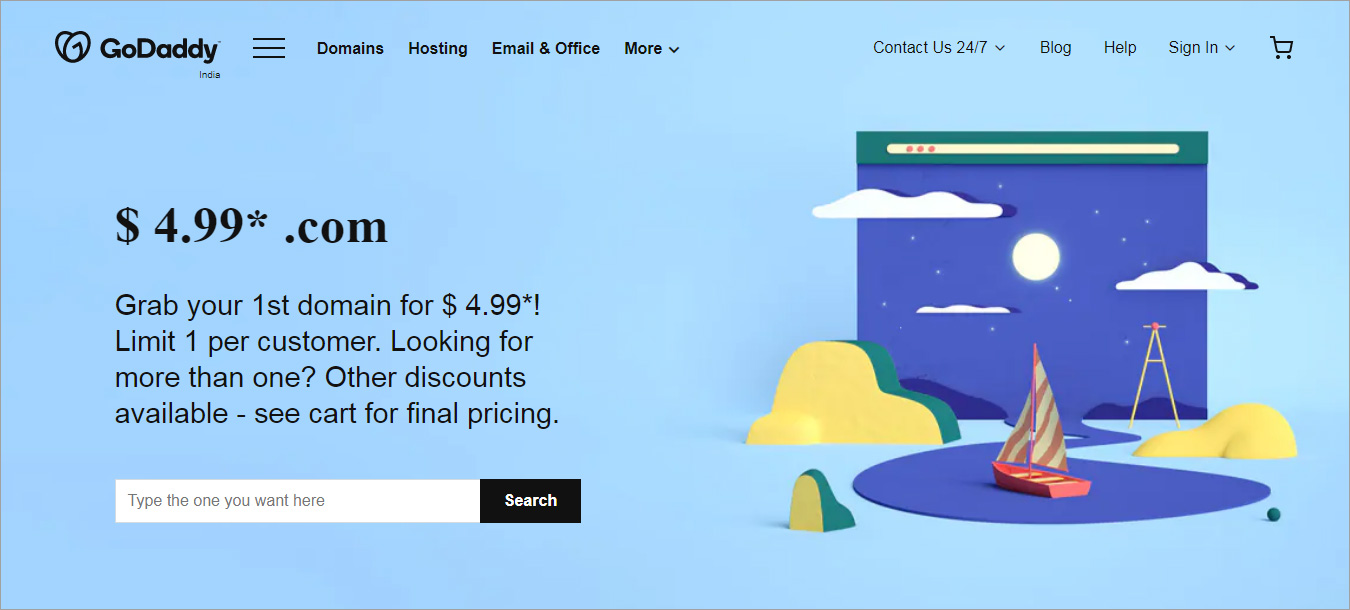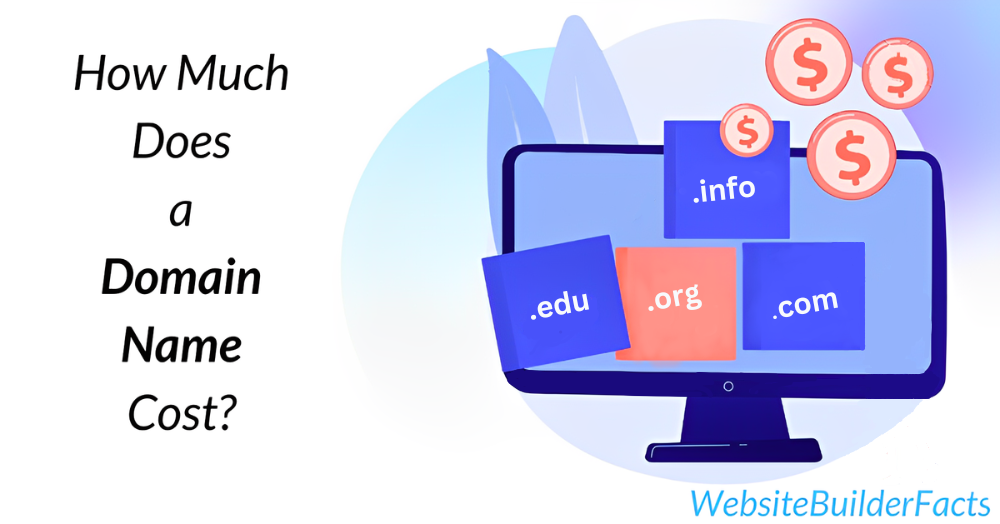A domain name is an important part of your brand in the long run. You want to get the best possible name for your business. However, a budget can play a vital role in your final decision. Therefore, here is a guide on how much a domain name can really cost and how much you should be willing to spend on your domain name.
A domain name is the unique name you assign to your site that allows your visitors and potential customers to find their way to you. Before diving deep, get familiar with the domain name basics. When it comes to the overall cost of a domain name, it can be quite complex as there are various factors involved. An popular and valuable domain name can cost you as high as hundred thousands while on the low end, you might be able to score a domain name for free. An average domain name can cost you around $10-$25 a year, depending upon the TLD and domain registrar you use. However, domain costing is not that simple. There are hidden charges which may surprise. Therefore, to unravel those surprises, websitebuilderfacts brought you this expert estimation on how much a domain name can really cost. Continue reading to dig deeper-
How much a typical domain name costs?

As I mentioned before, a typical domain name generally costs $10-$25 a year. However, the cost can vary depending upon the registrar you use, TLD you pick, and the kind of domain name you go for. To buy a domain name, you’ll have to register your domain through a domain name registrar. Different registrars offer different packages, so it’s better you do your research first. Domain registrars are basically companies that act as intermediate between you and ICANN (Internet Corporation for Assign Names and Numbers). It makes the process easier by letting you search for domain names, booking it and making payment through them. You may also read about how much does website cost?
Apart from registrar, the domain name cost can also vary depending upon the types of domain you pick. Two main types of domains are TLDs (top-level domains) and ccTLDS (country-code top-level domains). TLDs are the most domain types including .com, .net, .org, etc. whereas, ccTLDs implies its origin from a certain country like .us (America), .ca (Canada), .uk (United Kingdom), .in (India), etc. Here is a table of most popular registrars along with the introductory prices of popular TLDs and ccTLDs.
| Registrar | TLD Price: .com | TLD Price: .net | ccTLD Price: .us | ccTLD Price: .in |
| GoDaddy | $0.99/year | $10.17/year | $7.99/year | $3.49/year |
| NameCheap | $8.88/year | $11.98/year | $3.88/year | $3.88/year |
This is just a baseline introductory pricing list. If you want to conduct a full-fledged research. However, this pricing list is only a baseline for comparing the cost of a domain name per year. Keep in mind that those are just introductory prices. The renewal price increases every year along with other factors. Typically, GoDaddy’s 99-cent domain name will jump to $18.17 the next year. It can be higher for other domain registrars.
What factors account for the difference between the extremes and expected costs?
As I mentioned before, a domain registrar acts as an intermediate between you and ICANN. However, its role is not limited to being the intermediate only, it also offers some other services too. Those services can end-up as additional charges to you. This is the reason your general price of domain names often jumps up. Some of those factors are as discussed following-
Renewal and auto renew costs

You can never own a domain name for lifetime, you have to renew it from time to time. Auto-renew is a convenient option considering you want to commit to your domain name for a long term. With some registrars you get this option by default whereas with some registrars promptly have to sign up for this feature. For instance, registrars like GoDaddy and Domain.com offer auto-renew options by default. It means it will auto-renew your domain name license with a 45-day buffer zone when you sign up. Despite the given buffer, users still complain about this feature being difficult to cancel.
While other registrars like NameCheap offer no such option. You need to select this option promptly while signing up. However, if you do select that option, make sure you are ready to make a long-term commitment as it doesn’t offer any refunds for auto-renewals. Overall, this option is suitable for those who want to stick with their domain name for a long time.
Privacy and protection costs
While registering for a domain name you are asked for some personal info like your name, address, contact number, etc, which is further added to the Whois database. Whois database publicly lists the owners of every domain. While it is important to give the asked personal info, it is not necessary to make it available to everyone. There are domain registrars that offer a degree of privacy to your personal information so that it is not easily accessible to anyone. It can ultimately protect you from spam calls, emails, and other unnecessary spam. Some registrars offer free protection for the first year but with the renewal of the domain name, privacy and protection charges can also add-on. It is important to find a reputable registrar that can offer WhoIs protection. Sometimes, when you add privacy and protection while checking out, registrars can throw other add-ons that you might not need. Check carefully and deselect the ones you don’t need.
Transfer fees
A domain transfer is basically the process of changing your domain registrar. For instance, if you purchased your domain name from GoDaddy and want to shift to NameCheap due to any reason, this process is called domain transfer. Both your previous and latest domain registrars have to go through the Whois to make the transfer. Moreover, this process occurs separately from your website builder and your hosting provider. You might be under the impression that those services are intertwined, but that’s only when you get your domain registered from your web hosting company. However, the good news is that most companies offer free domain transfer. Make sure when you select a domain registrar, they offer free domain transfer, so you don’t have to pay any sort of transfer fees.
Business email accounts
While making a domain purchase, you will notice an add-on for email domains for setting up a professional business email address. However, be aware that you can get a free business email address with most web hosting companies and need not to pay additional for it. In case you’re looking for a more professional option, then it is wise to buy this directly from Microsoft Office 365 or GSuite to refrain yourself from being locked into a registrar.
What if the domain name I want is already taken?
As you must be aware that domain names must be unique. If it is already taken you can get that. For instance, you can’t register google.com as it is already in use. At this moment, there are more than 1.7 billion websites on the internet and this number is increasing at a rapid rate. Chances of your desired name being taken are great. Therefore, if a similar scenario happens, the cheapest option is to brainstorm different names that are available, if you are ready to compromise. However, if you don’t want to settle for any other name, then there are some other options too.
Premium domain names
Premium domain names are pre-registered domain names that are often shorter, memorable, and brandable. These are already taken by domain investors to sell them later at a higher price for profit. Some of the most popular premium domain names sold at a rather expensive costs in the history are-
- Hotels.com- $11 million
- Fb.com- $8.5 million
- Insurance.com- $35.6 million
- Business.com- $7.5 million
- Privatejet.com- $30.8 million
Premium domain names are rather costly domain names waiting to be sold at hundreds of thousands to million of dollars. It depends upon the domain length, uniqueness, and its overall branding potential. You can look into domain marketplaces like BuyDomains or Flippa if you want to get your desired premium domain name.
Expired domain names
Sometimes the domain name you desire can be expired and up for sale. Let’s say it was registered by someone else and now their license is expired. If they didn’t sign up for auto-renewal or don’t want to continue, then you can get that domain. There are tools like ExpiredDomains or FreshDrop that allow you to follow soon to be expired or expired domain names, so you can get them when it is available. Protip: Always check for domain abuse and other domain related issues before buying a used, expired, or pre-registered domain name.
Look out for unwanted surprises
There can be some unwanted pricings you are not aware of and they might come up as unfortunate surprises. You might feel like you are getting yourself into a good deal but can end up being scammed. Follow are some hidden charges you might want to avoid-
- Hidden fees: Most of the time, it feels like you are getting a deal that is too good to be true. If you feel that, it probably is. Sometimes they just tell you the basic cost buried within the terms of service, transfer fees, high renewal fees, long-term contracts and others.
- Scams: As we mentioned before, if a deal seems too good to be true, it probably is. Some domain registrars may offer ridiculously cheap or even free domain registration. However, they can end up charging ridiculously high administration charges or even manipulating your WhoIs records. Ensure that you are not getting yourself in a scam and always buy from a reputable domain registrar.
- Short term discounts: There are domain registrars that offer heavy discounts but it can only be availed only if you commit to long-term plans and pay for the package upfront. Then there are some registrars that offer short-term discounts but there can be higher transfer fees or renewal costs. Check such costs before committing to a domain registrar.
What option is best for me?
For most users, finding and buying a new domain name is the best option. It is the simplest and easiest route to get a domain name registered. You might not get the best deal but you will not encounter any complications as well. With some time and experience, your online assets will grow and it will make sense to negotiate for a domain or even purchase an expired domain. However, a beginner should go for a solid new domain.
A quick recommendation, go for NameCheap or Godaddy for domain registration. They offer an easy and affordable domain registration process and also take care of your domain management and renewal as well. They offer auto-renewal and notification features to let you know when your expiration date is close and you need to renew your domain license. If you are buying a domain name for the first time, go for Bluehost. You definitely need a web hosting to host your site then why not save some bucks and get your domain registered for free. It offers free domain registration for a year with a 12-months web hosting package. It makes domain management and renewal easier as you can manage your web hosting and website updates in the same place.
Conclusion
Domain name registration doesn’t have to be difficult or expensive. A little bit of research and mindfulness can save you from getting scammed. The big question is: how much does a domain name really cost? To answer this question: it totally depends upon your needs. If you want a typical domain name- it can be $10-$25. If you want to get a free domain name, it is also possible with a web hosting service. We also discussed the tools you can use to find a domain name and check its availability. We hope that this article helped to get an expert estimation on how much you should spend on your domain name. Please comment below and let us know your thoughts and suggestions.
